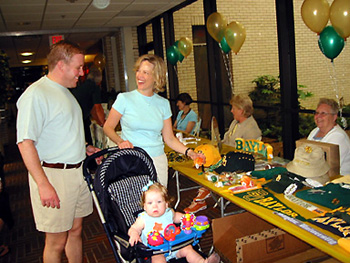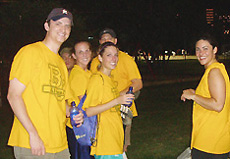Network Roundup
One test of any great university is the level of its alumni involvement. The Baylor Network, a department in the University that strives to connect alumni, is finding lots of Bears who are ready and eager to support their alma mater.
The Network was launched in July 2002, and the response to its initiatives has far exceeded expectations of administrators, says Randy Lofgren, the Network's associate vice president. "We ask the question, 'What do you need from the institution?' not 'What can you do for the institution?'" he says. "That's a cutting-edge dynamic in alumni relations work."
Baylor's alumni have answers. They want more career networking opportunities, groups of alumni to connect with after a geographic move, continuing education options and online connections with those who share life-stage or other common interests. "It's what is compelling in their life now," Lofgren says. "It may not have anything to do with what they did at Baylor as a student."
Kendall Cockrell, the Network's coordinator of young graduate programs, says that more than 800 young graduates participated in at least one of the 80 events planned around the country last year. "First, they come because we put on good events -- that's especially important to young alums. Second, they come because they were proud of the University or very involved while at Baylor. Third, people whose fondness for Baylor has grown over time come because they feel a desire to plug back in. That's true of many younger alums," he says. "We invite community by offering value."
Brenda Pruett, BA '83, a Houston area sales professional, is a prime example. In the past two years, she has become involved in the Baylor Business Network's breakfasts, is on a committee for the National Day of Prayer and participates in Baylor University Women's Association of Houston. But she wasn't always involved with her alma mater.
"When I left Baylor in '83, there was no contact made whatsoever. I may have received one or two requests to 'become' an alumna; I was already an alumna. There was not a compelling reason to join; I wasn't able to recognize any value in it," she says.
That changed for her when the Network began to offer programs. "Like any marketing campaign should be, you have to have a reason to be involved," Pruett says. "We're attempting to rebuild family -- because we were family at Baylor -- that somehow had gotten lost. It has caused me to reach out to and try to contact some of the people I knew in college and hadn't kept in touch with."
In Lubbock, a women's group held its first meeting last October. More than 60 attended, some driving more than an hour. Carol Kent, a field coordinator for the Network, helped the volunteers in this start-up effort and was overwhelmed by their enthusiasm. "Ruth Wilkerson (BA '57) truly deserves all the credit for getting the event on the calendar and making sure that all the details were taken care of," Kent says.
The Lubbock group approved bylaws and elected officers and made plans for its spring meeting and Diadeloso in April. "We sounded like a well-rehearsed a cappella choir as we sang the 'Baylor Line' at the end," Kent says. "The warm feelings generated by such a group are healing and affirming."
Lofgren says the interest extends nationally and internationally. "I could put a pin in a map of the United States for every call or e-mail I've received, and they would be all over. It's everywhere."
Internationally, alumni groups also are forming, with plans to hold Diadeloso events this spring in at least three cities abroad -- indication that the Network's motto of "linking the Baylor community worldwide" is gathering momentum.
One project the Network is most excited about is its online directory. Available at the Network's Web site (www.baylor.edu/alumni), the directory gives everyone the opportunity to participate easily. All graduates were sent a postcard last spring advising them they were included in the directory, and it was their option to remain in it. Alumni are asked to update their biographical information, and then the Network can pull data to arrange groups of alumni who share interests -- whether that's fantasy football, birding, parenting or vocational areas -- and then notify those alumni of that newly formed Web community.
"The directory is really the base of our operation. It feeds us the information which allows us to form various groups, whether online or wherever," says Alan Bowden, the Network's director of group programs and activities. He says one of the directory's biggest benefits to alumni is that, with the touch of a few keys, they can find a roommate or friend with whom they may have lost contact.
More than 19,000 alumni logged in and updated their bios in the first six months the directory was online, Bowden says.
In another initiative, Network coordinators are meeting with the deans of Baylor's schools and colleges to encourage partnerships. "Each school has a different way of relating with their alumni," says Brenda Morris, director of the Baylor Network. She cites Hankamer School of Business, which has a regional alumni business directory and monthly networking breakfasts, as an example of how a successful relationship can work. "We've had several people get jobs from our programming and find business opportunities in our directory," she says. "They know we're out there trying to help them."
Terry Maness, dean of Hankamer, recognizes the benefit of the Network's efforts. "The Baylor Business Network adds value to our business degrees because it allows students to stay connected with other alumni as well as the school after graduation," he says.
Other deans also have been receptive. The School of Engineering and Computer Science has added an online directory of its alumni, and the School of Music organized an alumni choir through the Network. "I went to the choir performance at Singspiration -- people were raving about the opportunity to sing together again," Morris says. "I hope the deans will see that when students have a good experience with Baylor Network, that's a good experience with Baylor."
There are several groups at Baylor that interact with alumni, including the Network, Parents League, Bear Foundation, Development Office, the Baylor Alumni Association and athletic groups. Through this multipronged approach, alumni seem to be getting the service they need, Lofgren says.
"In my opinion, it's not relevant to them who's doing what. They don't care; they just want the benefit. The Baylor Network is the University's response to expressed needs and interest of its constituency," he says. "You told us what you needed, we listened and we responded."
Houston resident Pruett, for one, is grateful. "I have just really enjoyed reconnecting. I want to make sure that those who are responsible for this know it's working."

